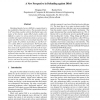Free Online Productivity Tools
i2Speak
i2Symbol
i2OCR
iTex2Img
iWeb2Print
iWeb2Shot
i2Type
iPdf2Split
iPdf2Merge
i2Bopomofo
i2Arabic
i2Style
i2Image
i2PDF
iLatex2Rtf
Sci2ools
111
click to vote
FTDCS
2004
IEEE
2004
IEEE
A New Perspective in Defending against DDoS
Distributed denial of service (DDoS) is a major threat to the availability of Internet services. The anonymity allowed by IP networking, together with the distributed, large scale nature of the Internet, makes DDoS attacks stealthy and difficult to counter. As various attack tools become widely available and require minimum knowledge to operate, automated anti-DDoS systems are increasingly important. This paper studies the problem of providing an anti-DoS service (called AID) for general-purpose TCP-based public servers. We design a random peer-to-peer (RP2P) network that connects the registered client networks with the registered servers. RP2P is easy to manage and its longest path length is just three hops. The AID service ensures that the registered client networks can always access the registered servers even when they are under DoS attacks. It creates the financial incentive for commercial companies to provide the service, and meets the need for enterprises without the expertise ...
DDoS Attacks | Distributed And Parallel Computing | FTDCS 2004 | Registered Client Networks | TCP-based Public Servers |
| Added | 20 Aug 2010 |
| Updated | 20 Aug 2010 |
| Type | Conference |
| Year | 2004 |
| Where | FTDCS |
| Authors | Shigang Chen, Randy Chow |
Comments (0)

